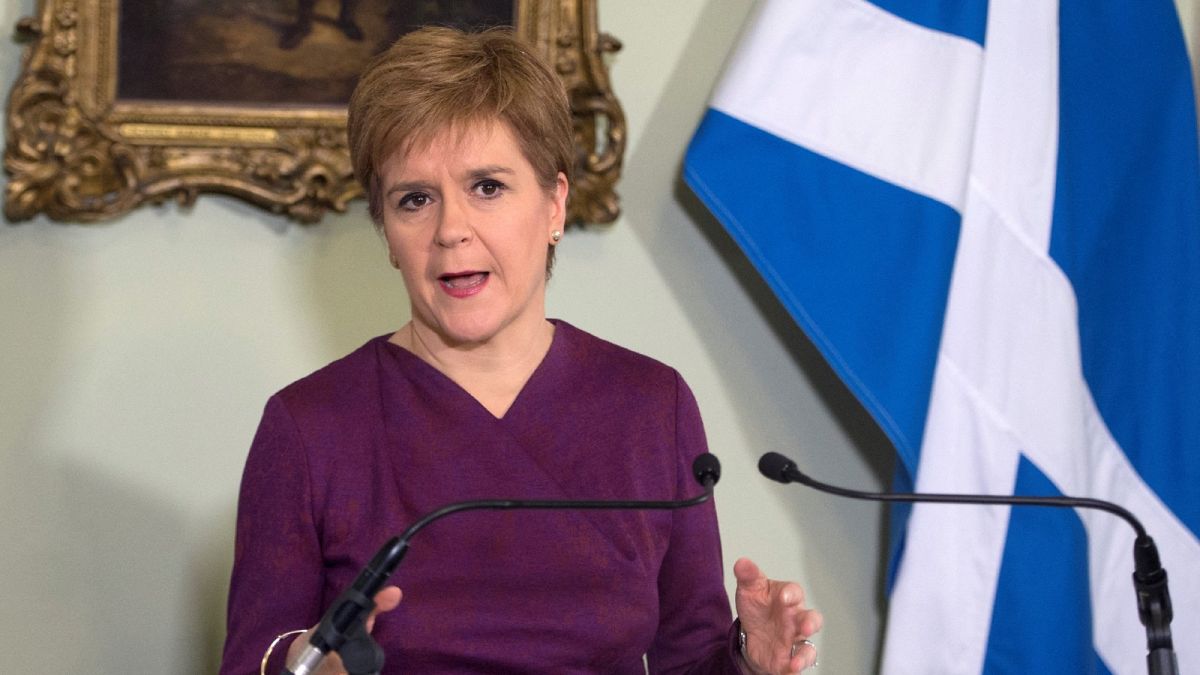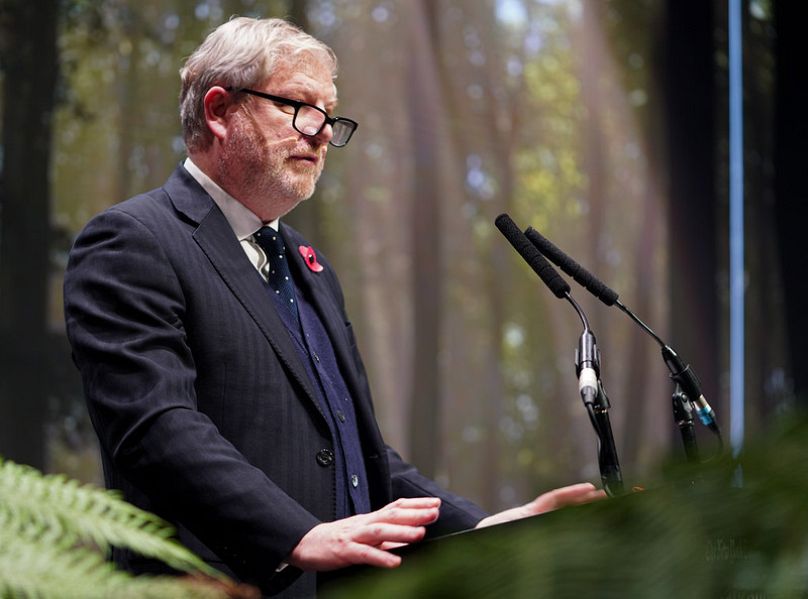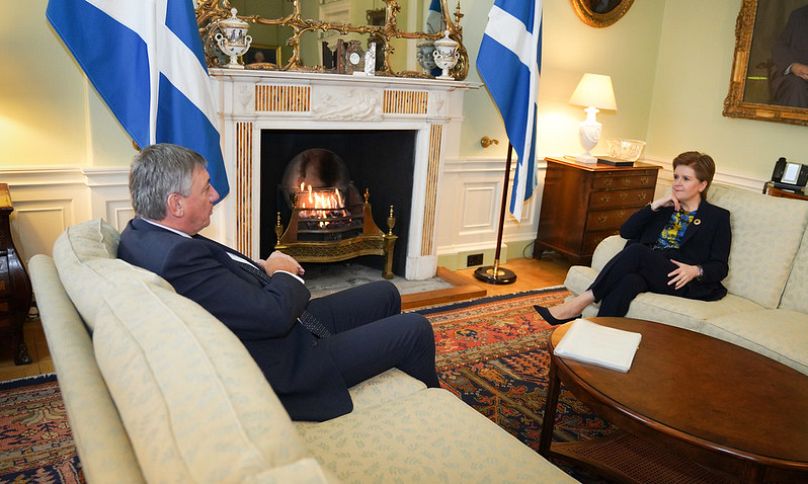“When the choice for Scotland is a pro-European, EU member state, independent Scotland, or a Boris Johnson Little Brexit Britain, I think people will vote yes [to independence]."
Since Nicola Sturgeon’s Scottish National Party won another term in office at Scottish Parliament elections in the spring -- picking up an extra seat, with an increased share of the vote along the way -- there’s been a steady uptick in diplomatic outreach.
From a revolving door of foreign diplomats keen to engage with officials in both Edinburgh and London; to Ms Sturgeon holding talks with world leaders and climate change activists at the COP26 summit in Glasgow (she’s known as “Elsie McSelfie” by some detractors for her love of social media pictures), it’s clear there’s a new focus on external relations ahead of another planned referendum on independence.
The man leading Scotland’s foreign affairs charge is Cabinet Secretary for External Affairs Angus Robertson, the country’s de facto foreign minister. The veteran politician, a former Vienna-based foreign correspondent, is one of Sturgeon’s most loyal lieutenants and returned to frontline politics in the May elections.
“The Scottish government is very keen that the rest of the world understands what’s going on with Scotland and where we are, that we’re open for business and that we’re working hard to recover from COVID,” says Robertson in an interview with Euronews.
“And for those governments that are particularly interested in the future of Scotland, the future of the UK, they want to know what is happening in relation to the forthcoming independence referendum.”
New independence referendum planned for 2023
Although most opinion polls still show a majority of Scots are against independence and in favour of remaining part of the UK, the Scottish government’s plans for a new referendum in 2023 hope to build on a trend that Robertson says shows a shift in the underlying numbers towards more support for independence, compared with the unsuccessful 2014 vote.
“When the choice for Scotland is a pro-European, EU member state, independent Scotland, or a Boris Johnson Little Brexit Britain, I think people will vote yes [to independence]," he says.
“We have a myriad of reasons why it’s important to have good external relations and we look forward to upgrading those when we become a sovereign state.”
Still, the "perfect storm" of continued domestic electoral success; a relatively weak political opposition at Holyrood; the damaging impact of Brexit on Scottish businesses; Boris Johnson’s scandal-prone government in Westminster; and the perception that Nicola Sturgeon has handled the COVID pandemic reasonably competently haven’t brought the big surge of support for independence the SNP will have hoped for.
Robertson says the Scottish government still has to pass legislation to prepare for the referendum and somehow get the UK government to agree to hold it, before moving on to the substantive discussion to convince more people that independence is the right answer for Scotland.
He says the detailed debate around independence will help convince many of the estimated 20% of undecided or previous "no" voters who are open to the idea of independence to shift to the ‘yes’ camp.
Upgraded presence in Copenhagen, opening a new mission in Warsaw
Before getting into the political and legal minefield of another independence referendum, the Scottish government is pressing ahead with its own external affairs plans for Europe.
Although in the strictest sense pure “foreign policy” matters are reserved to Westminster, there are plenty of areas where the Scots can operate more openly with international partners.
The Scotland House network, with offices in London, Dublin, Brussels, Berlin, Paris, Washington, Ottawa and Beijing, brings together trade development, education and cultural initiatives under one roof. It was first established by a Conservative-lead Scottish government and has been backed by successive administrations in Edinburgh ever since.
As part of a new coalition partnership with the Greens, the Scottish government will upgrade its current trade office in Copenhagen to full Scotland House status, and establish a brand new Scotland House presence in Warsaw.
“There are things we want to learn and no doubt there are things we can contribute and help our neighbours and friends across Northern Europe too,” says Angus Robertson, citing green energy technology and transition as a particular area of interest.
“We have links that are very historic across the region and we have a lot of reasons why it is important to work together now” he adds.
“I think that people are very pleased that Scotland is a proactive partner and that we have an excellent dialogue with friends and neighbours internationally, that’s how diplomacy works. it‘s based on human to human relations.”
Europe’s changing view of Scotland
Nicola Sturgeon’s diplomatic efforts have not gone unnoticed in European capitals, especially after the 2016 Brexit referendum when a majority of Scots voted to remain in the EU.
A resounding election victory -- with numbers that would make politicians in any European democracy envious -- and culminating with an assured performance during COP26 in her hometown, capped a standout year for the Scottish leader in international eyes.
“I think it’s a strategy that is very very carefully thought out, that this is the way to do it. This is the way to appear as a leader, to go on the world stage as much as possible, to create a sense of we are a nation, we are on our own, and we don’t want to identify with this clown Boris Johnson,” says Professor Marlene Wind, Director of the Centre for European Politics at the University of Copenhagen.
Professor Wind says Brexit “absolutely” shifted the perception of Scotland for EU leaders, even if you won’t catch any of them advocating for independence in public.
“I think behind the scenes there is a sense that Brexit has really changed things when dealing with a country [Scotland] that voted remain, that voted very very confidently to stay in Europe” she adds.
But Professor Wind strikes a note of caution when it comes to the planning and timing of another independence referendum, especially without overwhelming public enthusiasm.
“It’s also very important not to push it too quickly because they already had one shot at independence, and you cannot keep having referenda where you lose.”
Scotland taking a broader approach to international affairs
Beyond the two new Scotland House outposts on the cards to open in 2022, the Scottish government has also worked to develop engagement strategies tailored for bilateral relations with the US, China, Canada, India and Pakistan.
There’s been a joint review of Irish-Scottish relations carried out this year in cooperation with the Irish government -- the first of its kind; and an Arctic policy that considers Scotland’s role in the high north as a near-Arctic neighbour.
A high profile role at COP26 was the icing on the cake.
“You’re showcasing your country to the world on the biggest issue,” says Stephen Gethins, a former Member of Parliament for the Scottish National Party, and now a professor at the University of St. Andrew’s.
“Who better to showcase that than the leader of the country? And all the more so when Boris Johnson and the UK have a very poor international profile at the moment” he says.
Gethins, whose book "Nation to Nation: Scotland’s Place in the World" was published earlier this year, argues the UK would be more effective internationally if it "played the whole team" and included the Scottish government in foreign policy discussions, especially when international agreements on issues like climate change have to be implemented and delivered by devolved administrations.
“In many ways, the UK is particularly centralised in terms of foreign policy,” he says, citing Denmark’s formal arrangements with the Faroe Islands and Greenland as an example where semi-autonomous regions have broad latitude on international relations.
In the UK, he says, there is a “huge amount of ambiguity” when it comes to foreign policy matters.
“And if there’s ambiguity, there’s opportunity.”
Every weekday, Uncovering Europe brings you a European story that goes beyond the headlines. Download the Euronews app to get a daily alert for this and other breaking news notifications. It's available on Apple and Android devices.


